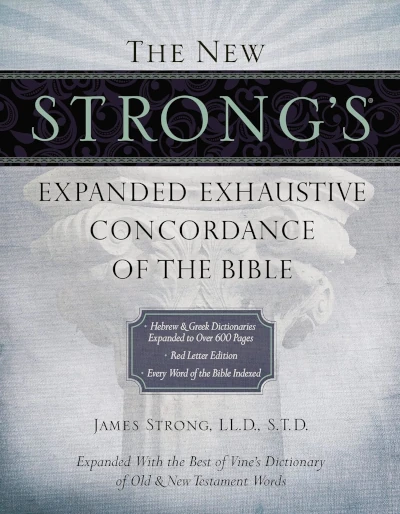In Romans chapter 6, the apostle Paul addresses one of the most important questions in Christian life: if we are saved by grace, does that mean we can continue in sin? His answer is clear and firm, absolutely not. Paul shows that grace is not permission to sin but power to live a new life. The chapter reveals how believers are united with Christ in His death and resurrection, leading to freedom from the bondage of sin.
Paul’s teaching moves from doctrine to application. He explains that when we were baptized into Christ, we were joined with Him in His death and raised to new life. The old self, enslaved by sin, has been crucified with Him. Therefore, sin no longer holds authority over us. This is not just a future promise but a present reality for those who belong to Jesus.

Strong’s Exhaustive Concordance
The New Strong’s Expanded Exhaustive Concordance of the Bible is a valuable tool for pastors, teachers, and students of the Bible. This expanded edition is computer generated for highest accuracy, and the Hebrew and Greek dictionaries have been augmented with definitions from the classic reference work Vine’s Complete Expository Dictionary of Old and New Testament Words. Get Yours on Amazon
Romans chapter 6 also reminds us that every believer must choose daily whom to serve. We can either obey sin, which leads to death, or righteousness, which leads to life. Paul contrasts the two paths to show that sin enslaves, but obedience to God brings freedom and holiness. The final verse summarizes this truth beautifully: “For the wages of sin is death, but the free gift of God is eternal life in Christ Jesus our Lord.” Through faith, we receive not only forgiveness but also transformation.
Romans chapter 6 teaches us that grace changes everything. It calls us to live as people set free, no longer bound to sin but alive to God through Jesus Christ.
The Question of Sin and Grace (Verses 1-2)
Paul begins with a question that many might ask: “Are we to continue in sin that grace may abound?” His answer is immediate—“By no means!” In Romans chapter 6, he challenges the false idea that grace encourages sin. Instead, he insists that those who have died to sin can no longer live in it. Paul’s argument is both logical and spiritual. If we have truly experienced salvation, we cannot return to our old way of life.
Grace does not give us permission to sin; it gives us the strength to overcome it. Paul reminds us that the believer’s relationship to sin has been broken. We are no longer its slaves but new creations in Christ. This transformation means our desires, thoughts, and priorities change. To continue in sin would contradict the very nature of our new identity. Romans chapter 6 begins by showing that grace is not a license for sin but the divine power that frees us from it.
Baptism into Christ’s Death and Resurrection (Verses 3-5)
Paul points to baptism as the symbol of our union with Christ. In Romans chapter 6, he says that we were “baptized into His death.” This means that when we accepted Christ, we identified with His death on the cross. The act of baptism pictures this spiritual truth: being buried with Him and raised to walk in newness of life.
Through faith, we share in both His death and resurrection. The old self that once lived in sin has been buried. We rise as new people empowered by His Spirit. Paul assures us that if we have been united with Him in death, we will also share in His resurrection. This unity is not just symbolic but real in the believer’s experience.
Romans chapter 6 emphasizes that salvation is more than forgiveness; it is transformation. Baptism declares that our old life is gone, and a new life has begun. Just as Jesus conquered death, we now walk in His victory. The same power that raised Christ now works in us to live for God.
Freedom from Sin’s Power (Verses 6-7)
In these verses, Paul explains that our “old self was crucified with Him.” This means that our sinful nature, once ruled by sin, has been put to death. The purpose is clear: that we should no longer be enslaved to sin. Romans chapter 6 declares that sin’s power has been broken. Though temptation still exists, it no longer reigns over us.
Paul uses the language of slavery to show the change that occurs in salvation. Before Christ, sin was our master. Now, through His death and resurrection, we are free. “For one who has died has been set free from sin.” This does not mean we will never sin again, but that sin no longer controls us. We are no longer bound by its chains.
In Romans chapter 6, freedom is not independence but new allegiance. We are liberated from sin’s rule so we can serve God. The crucifixion of our old self means that sin’s authority has ended. We now live under the grace and power of Jesus Christ.
Living with Christ (Verses 8-10)
Paul now shifts the focus from death to life. “If we have died with Christ, we believe that we will also live with Him.” Romans chapter 6 links our spiritual resurrection with Christ’s eternal victory over death. Jesus died once for sin, but now He lives forever, and death has no claim on Him.
The same truth applies to believers. Because we are united with Christ, we share in His victory. Death is no longer the final word. Our new life is rooted in His risen life, which means that sin and death can no longer dominate us. Christ lives to God, and so do we.
Paul wants believers to understand that this life is not only future but present. We are to live now with the awareness that we belong to the living Christ. Romans chapter 6 calls us to walk in this new reality. Just as He lives unto God, we are to live every day for His glory, with confidence that death has been defeated once and for all.
Consider Yourselves Dead to Sin (Verses 11-12)
After explaining what God has done, Paul urges us to think and act accordingly. “So you also must consider yourselves dead to sin and alive to God in Christ Jesus.” Romans chapter 6 teaches that the Christian life begins in the mind. We must believe what God says about our new identity.
To “consider” means to reckon or count it as true. We must see ourselves as dead to sin’s influence and alive to God’s will. Sin will still tempt us, but it no longer has rightful control. Paul warns, “Let not sin therefore reign in your mortal body.” This is a call to vigilance. We cannot allow sinful desires to take root again.
Romans chapter 6 reminds us that the victory Christ won must be embraced daily. We are no longer slaves to sin but servants of righteousness. As we renew our minds and yield to the Spirit, we live in the freedom Jesus purchased for us.
Instruments of Righteousness, Not Sin (Verses 13-14)
Paul continues with practical instruction. “Do not present your members to sin as instruments for unrighteousness.” Instead, he says, “present yourselves to God.” In Romans chapter 6, the word “members” refers to our body and actions. Every part of us should now serve God’s purposes.
We once used our abilities and energy for sinful things. Now, we offer them to God as tools for good. This change of direction is possible because of grace. Paul explains, “Sin will have no dominion over you, since you are not under law but under grace.” The law revealed sin but could not free us from it. Grace gives us both forgiveness and power to live differently.
Romans chapter 6 encourages believers to live consciously under grace’s rule. Our bodies, minds, and choices are to be yielded to God. When we do, righteousness becomes visible in our actions. Grace does not weaken moral responsibility; it strengthens it. We live uprightly because Christ reigns within us.
Slaves to Righteousness (Verses 15-18)
Paul revisits the earlier question: if we are under grace, can we sin freely? Again, he rejects the idea. In Romans chapter 6, he reminds us that everyone serves something. We are either slaves of sin, leading to death, or slaves of obedience, leading to righteousness. There is no middle ground.
He thanks God that believers, though once enslaved to sin, have obeyed “from the heart.” Through faith, they have been set free and have become slaves of righteousness. This means total devotion to God’s will. True freedom is found not in doing whatever we please, but in serving the One who gives life.
Romans chapter 6 teaches that our new servanthood is joyful. We now obey out of love, not fear. The heart transformed by grace desires to please God. Sin once ruled with cruelty; righteousness now reigns with peace. This transformation is proof that grace truly changes lives.
The Contrast of Outcomes: Sin vs. Righteousness (Verses 19-23)
Paul ends Romans chapter 6 with a sharp contrast. Serving sin leads to shame and death; serving God leads to holiness and eternal life. He urges believers to present their members to righteousness, resulting in sanctification. The choice is clear: the path of sin ends in death, but the path of obedience leads to life.
He summarizes this truth with one of the most well-known verses in Scripture: “For the wages of sin is death, but the free gift of God is eternal life in Christ Jesus our Lord.” Sin pays what it owes, death. God gives what we could never earn, life through His Son.
Romans chapter 6 closes with hope. It reminds us that every believer stands under God’s grace, not sin’s wages. Our new life in Christ is a gift that transforms both our present and our future. Because of Him, we live free, holy, and alive to God forever.
Closing Thoughts Romans Chapter 6
Romans chapter 6 is a powerful reminder that grace not only saves us but also changes us. The apostle Paul teaches that the believer’s old life is gone, and a new life has begun through union with Christ. We were buried with Him in death and raised with Him to live in righteousness. The cross broke sin’s power, and the resurrection brought newness of life.
Each section of Romans chapter 6 builds toward this truth: grace leads to holiness, not sin. We are no longer under law but under grace, no longer slaves to sin but servants of God. Paul shows that true freedom is not found in doing whatever we want, but in doing what pleases the Lord.
This chapter calls us to live as people who belong to Jesus. Every day we must “consider ourselves dead to sin and alive to God.” The Christian life is not about perfection but direction. We walk by faith, relying on His Spirit to guide us.
Romans chapter 6 invites us to embrace the victory Christ has given. In Him, sin’s wages are replaced by the gift of eternal life. That is the transforming power of God’s grace.
Continue Exploring Chapter Outlines
This outline is part of our growing collection of Chapter Outlines. You can explore more Bible Outlines or return to the Bible Study Toolbox homepage for outlines, studies, and resources to deepen your understanding of God’s Word. Contact us anytime.




